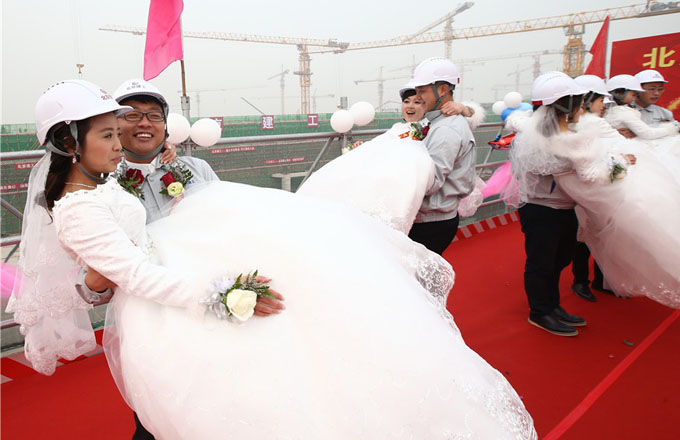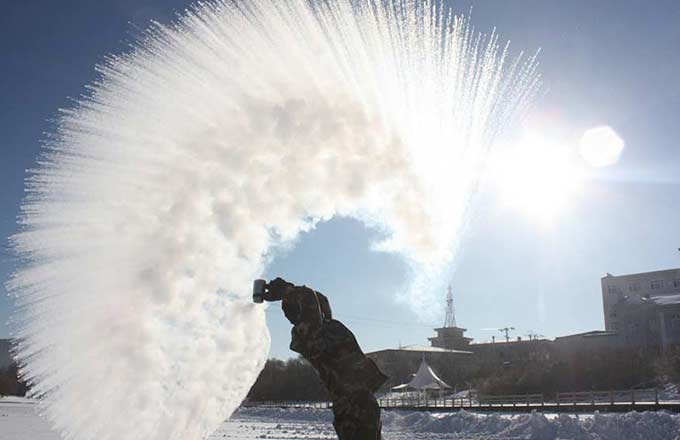Beijing accuses Tokyo of lying about targeting
Japan is defaming the Chinese military by spreading groundless allegations about the so-called radar targeting by China of a Japanese gunboat, China's military spokesman said on Thursday.
Geng Yansheng, spokesman for the Ministry of National Defense, said at a monthly news conference that Beijing, on the other hand, has "adequate" evidence of the Japanese military's close-range monitoring and surveillance of the Chinese navy.
Tokyo has been seeking to dodge the blame for escalating tensions in the Diaoyu Islands row by making baseless accusations against Beijing, a move that will deepen the regional divide and betray Tokyo's pledge to improve Sino-Japanese ties, experts said.
By making frequent references to the so-called radar lock-on incident in past weeks, Japan has deliberately spread false information to smear the Chinese military, while raising tensions and misleading international opinion, Geng said.
"The international community should stay highly vigilant over Japan's tendencies," Geng said.
Jiang Xinfeng, an expert on Japanese studies at the PLA Academy of Military Sciences, said Tokyo is trying to make China a scapegoat and "prompter of emergencies" through media hype on the radar allegation, and it wants Beijing to be blamed.
Meanwhile, Japanese Prime Minister Shinzo Abe, in a policy speech to his country's lower house, once again cited the fabricated "radar lock-on" incident as "a dangerous move that may escalate the situation".
"Japan is aiming at stirring up the East China Sea tension with a series of incidents that have entangled China, and it is seeking more bargaining chips in future negotiations with China," Jiang said.
Ties between China and Japan were severely damaged in September after Japan illegally "purchased" part of China's Diaoyu Islands, which led to strong protests and enhanced regular patrols around the islands in the East China Sea. Three China Marine Surveillance ships patrolled the waters off the islands on Thursday, the State Oceanic Administration said.
Abe, however, also said in his Thursday policy speech that "stand-alone issues" should not affect the bigger picture of Japan-China ties, and he hopes that relations can "return" to the original starting point of a "strategic and mutually beneficial relationship".
Yang Bojiang, a researcher on Japanese studies at the Chinese Academy of Social Sciences, said maintaining a "strategic and mutually beneficial relationship", which was established in 2008, will never be a reason for China to trade the islands, and Tokyo has a "different understanding" of the concept.
Disregarding a previous political consensus with Beijing to shelve the dispute, the Japanese government has long refused to recognize the existence of the Diaoyu Islands dispute, a move Yang said "has made Japan eat its words in front of the international community".
Abe on Thursday reiterated Tokyo's denial of the dispute, and reiterated Tokyo's determination to "guard the islands".
"We have reason to doubt Abe's sincerity" about improving ties, Yang added.
Japanese military ships and planes have long tracked and monitored Chinese vessels and aircraft at close range in the East China Sea, which "endangers security" and is the bedrock cause of air and maritime security issues between China and Japan, according to Geng, the spokesman. "China will retain the right to adopt pertinent measures," Geng said.
Zhou Yongsheng, a professor on Japanese studies at China Foreign Affairs University, warned that Japan is now using island disputes with its neighbors as an excuse to justify military operations and lift bans on the country's post-World War II pacifist Constitution.
"If the international community fails to deal with such attempts, Japanese politics possibly will spin out of control," Zhou said.
Contact the writers at zhangyunbi@chinadaily.com.cn and zhaoshengnan@chinadaily.com.cn



















